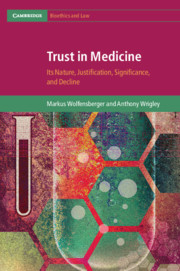Book contents
- Trust in Medicine
- Cambridge Bioethics and Law
- Trust in Medicine
- Copyright page
- Dedication
- Contents
- Figures
- Tables
- Preface
- Acknowledgements
- A Note on Usage
- Part I Introduction
- Part II The Nature of Trust
- Part III Justification of Trust
- 8 Justification of Epistemic Trust
- 9 Justification of Patients’ Trust in Physicians
- Part IV Significance of Trust
- Part V The Decline of Trust
- Part VI Perspectives
- References
- Index
- Series page
9 - Justification of Patients’ Trust in Physicians
from Part III - Justification of Trust
Published online by Cambridge University Press: 19 August 2019
- Trust in Medicine
- Cambridge Bioethics and Law
- Trust in Medicine
- Copyright page
- Dedication
- Contents
- Figures
- Tables
- Preface
- Acknowledgements
- A Note on Usage
- Part I Introduction
- Part II The Nature of Trust
- Part III Justification of Trust
- 8 Justification of Epistemic Trust
- 9 Justification of Patients’ Trust in Physicians
- Part IV Significance of Trust
- Part V The Decline of Trust
- Part VI Perspectives
- References
- Index
- Series page
Summary
Here, the authors present two justifications usually cited as sufficient to warrant patients‘ trust in physicians: professional status and individual merit. Whereas in ‘status trust’ professionalism is taken as a guarantor of trustworthiness, in ‘merit trust’ a physician’s trustworthiness is assessed individually. On either account, trust is justified by the physician’s professionalism. ‘Professionalism’ may be defined as ‘acting trustworthily’ in exchange for autonomy of decision-making, whereas trustworthiness refers to ‘competence’ in terms of episteme (theoretical knowledge), techne (craft or skill), and phronesis (practical knowledge or experience), and ‘commitment’ as ‘to act in a way that the truster approves’. The authors argue that although in principle trust in physicians is justified, since both professionalism and individually assessed trustworthiness grant derivative authority, the reality is different. because an increasing number of patients reject the concept of professionalism and, accordingly, find it difficult (or even impossible) to assess physicians’ trustworthiness. Hence, they no longer believe that their trust in physicians is justified.
Keywords
- Type
- Chapter
- Information
- Trust in MedicineIts Nature, Justification, Significance, and Decline, pp. 119 - 142Publisher: Cambridge University PressPrint publication year: 2019

